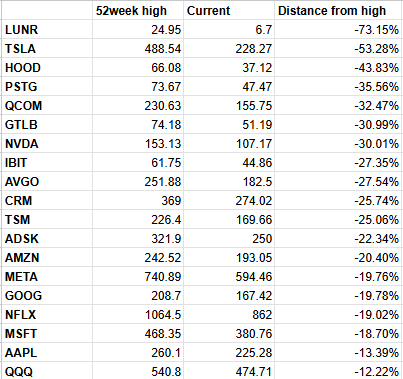I’ve added to my Cisco January 13 $20 st…
I’ve added to my Cisco January 13 $20 strike price calls and will continue to look to add to existing positions into the close depending on how much we might sell off in the contra (final) hour.
As the markets’ sell offs accelerate here as word of Saudi Arabia’s dictatorship shooting on demonstrators in the country, we obviously have to ask ourselves if we also should be reacting and getting more cautious as the rest of the world’s traders and investors seem to be. Here’s something I wrote for the Revolution Investing newsletter about how much these Middle East and North African revolutions factor into my broader playbook and approach to building my portfolio. Basically, you could almost substitute “Saudi Arabia” everywhere you see “Egypt” in the analysis below:
The Middle East is full of escalating political revolutions. The thirty year rule of an oppressive, but “U.S.-friendly”, dictator is collapsing, following up a full-fledged political upheaval in Tunisia. The king of Jordan, another “U.S.-friendly” dictator, just fired his entire cabinet Tuesday morning as protests in the streets over the accelerating inflation in food and fuel there flared up.
Revolutions are scary and unpredictable but that’s exactly what this newsletter, Revolution Investing is all about. So let’s walk through the likely economic and market ramifications of the grass roots-driven democratic revolution of the Middle East in the 21st century, including some likely winners and losers.
First, let’s talk political ramifications, both domestic and geopolitical. The fact is that the Republican/Democrat Regime in power here in the U.S. has been giving more than a billion a year in aid to the violently oppressive Mubarak regime. Much of this money has gone to aid and equipment for the military and police forces, which, because they face no serious outside threats, are all trained upon their own citizenry.
Yes, “aid” in large part has meant that the Republican/Democrat Regime has given direct and monetary aid of weapons, training, autocratic dictatorship, censorship and has otherwise has helped oppress the people of Egypt. That’s in large part because Egypt is the, as the mainstream thinking goes, “cornerstone” of the U.S. foreign policy in the Middle East. And that’s in large part because Egypt has signed a treaty with the U.S. and Israel and has actively supported the blockade on Gaza and Palestine.
And the Republican/Democrat neo-con/neo-liberal has a standard policy of bribing any government, regardless of oppressive and non-democratic underpinnings, to help enforce “economic sanctions” against the people living under anti-Israel and anti-U.S. governments around the world. Ironically, the stated mission of such sanction/forced-suffering foreign policies is that to encourage the suffering of the people in those places to the point of hoping for a hunger-driven overthrow of those governments — exactly what is happening in Egypt and Tunisia where our “aid” dollars have been going in the name of helping the people and economies there. Backfire much, Republican/Democrat Regime?
Years ago, I wrote in the Financial Times about the corporate-funded Republican/Democrat idea of giving corrupt governments in Egypt and other African nations money to buy grain from the U.S. undermines any chance of those countries creating self-sustaining farming economies. Can you imagine how enraged our oil companies would be if our government took “aid” money from Russia to buy Russian oil to give out to the people for free? Indeed, from a certain perspective it would appear that our so-called $1 billion plus in annual “aid” to Egypt has mostly enabled an oppressive dictatorship government there to buy guns, tanks, and secret military training services while decimating the internal farming, banking, and market economy.
And so the people revolt. And it’s scary for the markets here. The mainstream thinking from the Republican/Democrat Regime and the mainstream media it feeds is that because we might lose one of the few Arab governments controlled by the Republican/Democrat Regime here that Israel instantly becomes more threatened. And that might be true, but from a broader economic perspective, if you believe that free markets and freedom and democratic republics are the most productive, profitable and virtuous, then in the longer run, any steps that take the Middle East closer to such ideals would be good for them and good for the global economy and good for our markets.
The worst political outcome would be if some new clearly anti-U.S. and worse, anti-West-in-general, violently oppressive regime replaces the one just disposed.
The best political outcome would be if a new free-market, democratic republic were to be set up and enforced by the citizens of these revolting nations.
The upside of adding billions of suffering Middle Eastern peoples to a private-property-based, mostly free market economy, and then seeing them contribute to the global economy, is actually rather exciting, if you’re able to look past the standard “but we might lose a U.S. ally” line of thinking.
Two more mainstream points to hit on:
The economies of these revolting nations are at a standstill. Yes, and it’s likely that for the next year or two that those economies won’t improve much. But let’s remember that the very reason these people are revolting is because their economies are puny, the masses their have a brutal economic plight and that these economies are not exactly big demand drivers for any other nation or the global economy anyway.
Oil might spike as unrest in the Middle East, where so much of the world’s oil comes from, which can’t be good for crude. That might happen in the near-term, as supply channels from the revolting nations are temporarily disrupted. But a freer-market, less-government-controlled, supply chain of oil would, as always, drop prices tremendously as efficiencies and productivity skyrocket. More to the point, as far as our investment strategies go, our PowerShares DB Agriculture (DBA 34.26, -0.80, -2.27%) inflation bet would benefit from any near-term oil price spikes.
Remember back in November when the U.S. stock markets and most of the stocks we are long in the Revolution Investing portfolio were much lower than they are today and everybody was panicking about Ireland’s sovereign debt problems? At the time, I wrote:
“Europe troubles. Did you hear about them? Everybody I know on Wall Street is panicking over the fact that Ireland’s government can’t pay back all its loans. But should they be? I’ve been investing and trading for fifteen years and one of the biggest lessons I’ve learned over that time is: Ignore Europe.”
A variation on that is probably an appropriate way to answer the following emailer’s question, one of many I got this past week on the topic of Egypt:
Cody,
I must admit, with Egypt going crazy I’m tempted this weekend to sell every stock I own! The situation there can get very bad, with my biggest fear being that it will spill over into Saudi Arabia. I do own shares of SPDR Gold Trust (GLD 137.82, -1.59, -1.14%) and United States Gasoline Fund (UGA 49.11, -0.05, -0.10%) but maybe I need much more of those!
So, what are your thoughts and suggestions regarding this issue. Hang tight or run for the hills?
Keep up the great work,
Bob
Bob, I think that we should not ignore Egypt, but let’s learn more about it and let’s try to support and foster a new democracy there and throughout the Middle East. As always, let’s stay vigilant and let’s not get impulsive.
See those last words there? “Let’s stay vigilant and let’s not get impulsive.” Let the others do that and let’s keep cool and try to set ourselves up to profit from all of this movement.




